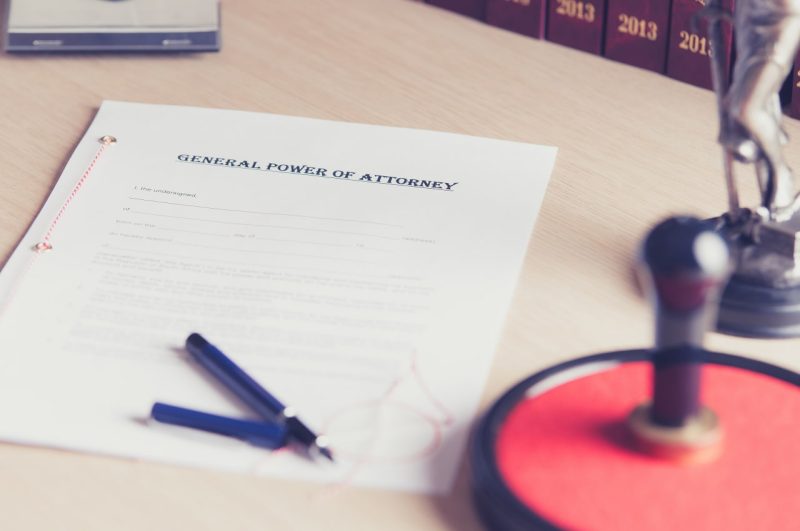Power Of Attorney In Florida & Its Fundamental Process
Power Of Attorney In Florida & Its Fundamental Process

A Better Understanding Of The Power Of Attorney
A Power of Attorney is a legal instrument that enables you to conduct financial transactions even if you can’t be physically present to transact business or sign papers. It allows another person to act on your behalf should you become ill or disabled.
Make the effort to learn your rights and duties under powers of attorney for property and healthcare in Florida. Taking the time to tackle these concerns prior to the necessity for such decision-making support might be beneficial for you and for your loved ones in the future.

It is helpful to understand some fundamental words when discussing the Power of Attorney in Florida. A Power of Attorney is a legal instrument that authorizes a person, known as an agent, to make decisions on behalf of another person, known as the principal.
- General Power Of Attorney. This is one type of Power of Attorney granting the agent extensive authority to perform all sorts of personal or business transactions.
- Special Or Limited Power Of Attorney. This Power of Attorney restricts the agent’s authority or power to make decisions on specific transactions within a specified period.
- Durable Power Of Attorney. This type of power of attorney does not expire or get terminated due to the illness or disability of the principal.
- Springing Power Of Attorney. This Power of Attorney won’t take effect until after the principal is declared incapacitated.
- Incapacitated. The state of Florida defines the term “incapacitated” as the inability of a person to acquire, manage, dispose, or transfer tangible and intangible assets, business assets, earnings, and benefits.
Steps In Obtaining A Power Of Attorney
A Power of Attorney is obtained through a number of processes. You must adhere to the right procedure to avoid obstacles along the way.
Create A Power Of Attorney
The Power of Attorney form must be completed and signed in the presence of a notary public and two witnesses. This legal instrument includes relevant details like the date of signing, expiration date, limits on the powers provided, special requests you may have for medical care, etc. It is critical that every detail is written correctly. If you have questions or concerns, you should consult with an attorney at The Estate Plan in Coral Gables, FL when writing the agreement.
Appoint An Agent Or An Attorney-In Fact
As the principal, you should delegate authority to a person you can trust or who can look out for your interests. When selecting someone as your agent, ensure that they know their job and responsibilities stated under the Power of Attorney agreement so there’ll be no surprises later on. It is also vital that they are aware that they cannot abuse the power vested in them and use it to their advantage. They must always carry out your desires as specified in the Power of Attorney.
Informing All Persons Involved In The Power Of Attorney
After signing and notarizing the Power of Attorney, a copy of the document must be given to your agent and all other people who require access to it, such as banking institutions or medical doctors. This ensures that everyone concerned is aware of who has been designated as your agent.
Requirements In Obtaining A Power Of Attorney In Florida
In a Power of Attorney, there are certain requirements that need to be accomplished. Take time to understand them to make the process as smooth as possible.
Governing Laws
The Section 709.2101 of the Florida Power of Attorney Act contains the provisions for the Power of Attorney for property and finances. In contrast to several other states, Florida does not permit a springing Power of Attorney and an authorized form of such document. Since there is no recognized form in Florida, it makes it more complicated to obtain a Power of Attorney in this state.
Contents
Florida law states hardly anything about the contents of a Power of Attorney. No provision states that if you wish to form a durable Power of Attorney, you must incorporate the following line, “This durable Power of Attorney is not terminated by subsequent incapacity of the principal except as provided in Chapter 709, Florida Statutes.”
Agent
Your agent must be a person over the age of 18 or a financial institution with trust powers. The agent must also be a resident, has a business in Florida, or has the authority to transact trust business in Florida, according to Florida law. The agent you choose must be a person you can trust to manage your assets, work in your best interests, and make sensible monetary decisions for you.
Execution
A Power of Attorney in Florida must be signed and stamped by the principal, together with two witnesses, to be effective. If the principal is incapable of signing due to physical limitations, the notary public may simply place the name of the principal on the document.
Getting A Power Of Attorney For An Elderly
When a family member reaches the age of 65, it is critical to consider obtaining a Power of Attorney for them. As seniors, they must act double time to assign power to a person who will manage their estate.
This agreement empowers the designated agent to engage in legal and financial concerns as if they are the older adult. It enables them to gain access to documents and accounts that would otherwise be unavailable.
Obtaining a Power of Attorney for an elderly can be challenging. But, with the right study, preparation, and communication, it can assure their long-term health and financial well-being. It is crucial that they choose an individual who is trustworthy and reputable enough to bear such duty on your loved one’s behalf so that their desires are fulfilled throughout the process.
Regardless of who you choose to occupy the role, having a Power of Attorney in place can bring ease of mind knowing that your beloved’s best interests are considered even when they are unable to do it themselves.
Other Specifications Of A Power Of Attorney In Florida
In addition to the requirements needed in a Power of Attorney, there are other crucial points you should be aware of. The impact of the document is influenced by these variables.
Powers Of Attorney Obtained Outside Of Florida Are Acceptable
If you acquired a Power of Attorney outside of Florida that is valid in another state, it still remains valid in Florida. If a third party is required to recognize an out-of-state Power of Attorney, they may seek an opinion from an attorney concerning the power’s legitimacy. Military Powers of Attorney are likewise permissible in Florida as long as they are carried out in accordance with applicable federal law.
Third Parties Declining A Power Of Attorney Must Explain In Writing
Third parties need to agree to or refuse a Power of Attorney within a given time, typically four business days for most banking institutions. The reasonable period for third parties is determined by the terms and extraordinary circumstances of the Power of Attorney. An agent might also be required to sign an affidavit stating that the principal is still alive. As a result, the Power of Attorney is still enforceable.
A Power Of Attorney Must Confer Specific Powers
A wide grant of authority in a Power of Attorney is not recognized by the law. The powers that provide an agent the ability to accomplish all the principal could do are unconstitutional. An agent can only carry out the acts specified in the document. For instance, if the agent is to handle investments or bank transactions, the new legislation defines certain banking or investment tasks that they may do in the absence of detailed specifics in the agreement.
Qualified Agents May Be Compensated
The legislation permits all agents to be paid for their expenditures incurred while carrying out the principal’s instructions. Only the following individuals may be compensated:
- The heirs and spouse of the principal.
- Attorneys and CPAs.
- Financial entities having trust powers.
- Individuals residing in Florida not handling more than three principals at the same time.
Photocopies Are Allowed
Electronically filed copies and reproductions of the Power of Attorney can function in the same capacity as the original. But in transmitting real property documents, it requires the original Power of Attorney to be recorded in a county’s official records.
Agents Are Required To Retain Records
All revenues, payments, and dealings made on behalf of the principal must be recorded. If the principal requests that the agent visit a safe-deposit box, the agent must produce an inventory of the items every visit.
Conclusion
A Power of Attorney is a helpful legal instrument for designating another person to take action for you in the event that you are unable to do so. However, specific conditions must be fulfilled before acquiring one in Florida, which includes:
- Establishing and agreeing to the document in the presence of a notary public and two witnesses.
- Assigning a trusted agent who knows their functions on the basis of the Power of Attorney.
- Giving replicas of the agreement to those persons needing access, such as banking institutions or physicians.
When appointing an agent, go with someone who is trustworthy and reputable, someone who will obey your desires in things pertaining to your loved one’s health and money. Consider entrusting these vital tasks to a capable adult or close friend. To minimize future arguments or misunderstandings, it is critical that all parties are aware of their roles and duties prior to making any choices.
You can withdraw a Power of Attorney at any time if you believe it no longer serves its purpose or if circumstances necessitate revoking it, such as the death or incapacity of the principal holder, or if there is no longer trust between the parties engaged in the arrangement. Following this process in acquiring Power of Attorney in Florida will assure you that all parties are aware of how to proceed if necessary.
&
Have questions about how to get started on your estate plan or estate needs?
Have questions about how to get started
on your estate plan or estate needs?
Contact the experienced estate planning professionals at The Estate Plan
by calling us at (305) 677-8489.
Contact the experienced estate planning professionals at The Estate Plan by calling us at
(305) 677-8489.

